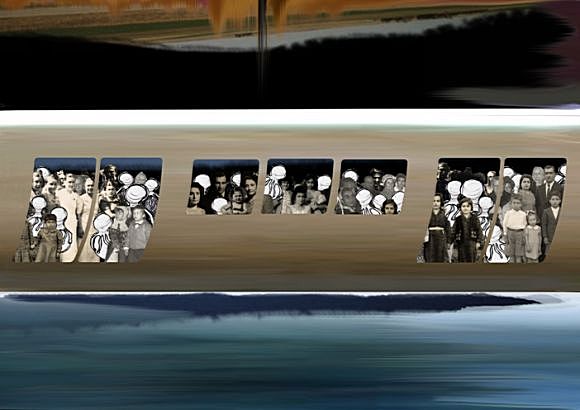Tintin Wulia
Train (Tintin Wulia, 2007), detail from Have a Cup of Tea/Meet My Dead Grandfather (Gyora Glupczynski/Tintin Wulia, 2007), webpage, flash animation and digital print. Various dimension (browser-dependant) and 6x6 grid of A4-sized type C print |
The discrepancies between the personal and the political have been central to my practice as an artist. I think this is because I was born and bred in a Chinese-Balinese family that survived 1965. Recounting the past ten years of my artistic research, in this essay I will illustrate how I have found the experiences which accompanied the regime change of 1998 to be complementary to the traumatic events and mass killings of alleged communists in 1965. I have also found that reflecting on 1965 can help us re-contextualise the newly revived ‘Chinese-Indonesian’ identity within ‘Indonesian’ identity. This is because we can see the experiences of 1965 as a common ground shared by many ‘Chinese’ and ‘non-Chinese’ Indonesians.
Late night with Yanto
As part of an exhibition in late January 2008 in Yogyakarta, I painted my Great Wallpaper series (2008), a set of watercolour murals of my family’s legal documents. For technical reasons, I had to work late nights. One night, Yanto (not his real name), the new nightguard at the gallery, insisted on helping me. At one point he suddenly asked whom the legal documents belonged to. Happy to come across a conversation piece with him, I explained how the documents traced my family’s endeavours as Chinese-Indonesians to fit in with Indonesia’s socio-political changes. I described some of the many regulations which discriminated against Chinese-Indonesians, taking an as example the decree number 127/U/Kep/12/1966, which suggested Chinese-Indonesians should change their names and adopt ‘Indonesian’-sounding names to accelerate assimilation.
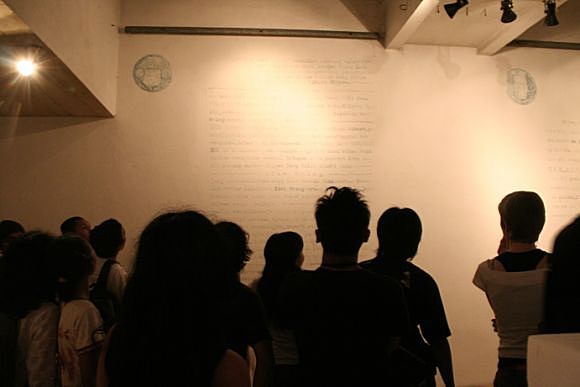 |
Installation view of Great Wallpaper No. 12/2602 (Tintin Wulia, 2008), watercolour mural, wall heightSari Handayani |
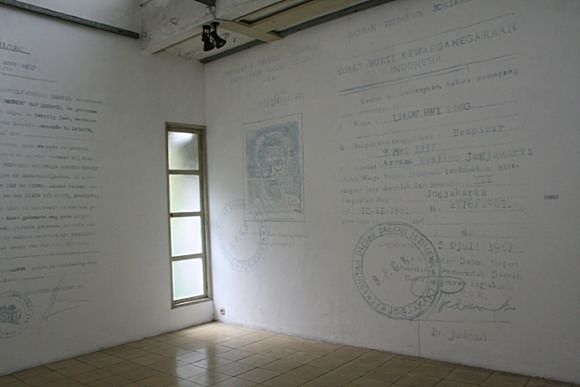 |
Installation view of Great Wallpaper No. 470/I/Sbki/67 (Tintin Wulia, 2008), watercolour mural, wall heightSari Handayani |
Frankly, I imagined Yanto would not understand. Superficially speaking, class and ethnicity considered, our lives were a world apart. I anticipated a pause leading up to silence, in which I would reflect on whether – as an artist – I will ever make any difference. Contrary to my presumption, however, Yanto continued talking, describing his own experiences with bureaucracy, particularly regarding his late father’s name change and birth certificates.
Gradually, Yanto disclosed that his father was an accused communist. In 1965, the administrator of his father’s village was ordered to list the names of 25 communist party members in his village. Frightened to hand in a blank list, but knowing too little about the communist party, he randomly selected 25 names. Years later, Yanto was denied a high school scholarship he was very much dependent on, because his father’s name was listed.
The event took away Yanto’s simple dream to be a civil servant, a profession he thought would break him free from poverty. He was infuriated, but did not know at whom he should direct his anger. He believed it was Suharto who took his dream away, but he was too fearful to be angry at Suharto.
How 1998 sparked questions about 1965
My first short film, Violence Against Fruits (2000), was about the May 1998 riots. During these riots, which preceded the resignation of President Suharto, many rioters targeted Chinese-Indonesians, especially in Jakarta and Solo. Playing around the ambiguity surrounding the riots, this intuitive piece was based on the memory of feelings rather than of facts. The piece shows a Diospyros Kaki (Japanese Persimmon) being chopped and finally eaten, with text describing the history of the fruit (including how Diospyros Kaki originated in China but is popularly misunderstood as coming from Japan). This visual is accompanied by soundtrack of dialogue between a male and female about the reasons people do not eat dogs, going through possibilities such as dogs being humans’ best friends and dogs being capable of fighting back. In this short film, the feeling of being a victimised Chinese-Indonesian was prominent.
I grew up with that feeling of being victimised and was taught it was better not to question it. The reason was never clear to me, but I suspect it was because my family had a big secret: my grandfather was taken away in 1965. As part of this unquestioning attitude, I subconsciously accepted that I was born a guilty Chinese, perhaps a communist’s granddaughter, therefore deserving the discrimination.
I grew up with these memories, of which the most subtle yet perhaps strongest was the memory of fear
My family never talked much about 1965, but I knew that their house was looted and burnt down. I was born seven years later and therefore had no memory of the facts. Yet however well the facts were hidden, the memory of feelings kept lingering within my family. I grew up with these memories, of which the most subtle yet perhaps strongest was the memory of fear.
Ketok (2002), another of my short films, was intended to, amongst other things, poke fun at the then popular horror TV series in Indonesia. The film was an amusing hit amongst my Indonesian audience. However, a few non-Indonesian viewers asked whether the events of September 1965 were behind the light-hearted story. Apparently, in making the film I utilised the language of horror I was most acquainted with, the core of which might have originated in 1965.
Growing up with the memory of feelings but without a memory of the facts was comparable to growing up injured without knowing where the wound was, and how it happened. Under such circumstances, it was almost impossible to revisit the source of the injury to take steps towards healing it. The Jakarta riots of May 1998 enabled me to connect this memory of feelings with some possibilities of facts. I thought perhaps what happened to many families in 1998 was similar to what happened to my family in 1965.
Parallel lives of kites and roses, by any other names
In 2004, I discovered an interesting story behind an interesting name. It was through Farishad Latjuba’s short film Klayaban (The Tale of an Outcast, 2004), based on a short story by Sobron Aidit (see Farishad’s blog at http://flatjuba.blogspot.com/). In early 2005, I began interviewing Sobron Aidit and his family.
For many of my generation, the name ‘Aidit’ makes a terrifying echo. Dipa Nusantara Aidit, the leader of the PKI (Indonesian Communist Party) was depicted as a sadistic, cold, ambitious, chain-smoking character in the film Pengkhianatan G30S/PKI (Treachery of the 30 September Movement/PKI) directed by Arifin C. Noer in 1984. This film was our only official audiovisual resource on the communists’ so-called bloody coup attempt in 1965. It was compulsory for us to watch it during our school days in the 1980s. It so happened that one of Aidit’s twin sons, Ilham, was my college senior — I remember friends whispering about his parentage with quivering fear.
In 1963, one of Aidit’s younger brothers, Sobron, a Sinology enthusiast from a religious Muslim family in Belitung, together with his wife, were officially assigned to teach Indonesian in China. Taking their first baby daughter with them, they excitedly left Jakarta for Beijing. There, in 1964, their second daughter, Wanita Tekun Pertiwi (now Anita Sobron), was born. Following the 1965 coup in Indonesia, however, Sobron’s family became stateless, together with hundreds of overseas Indonesians. The family was exiled in China for 17 years before they eventually sought refuge in France (for more on Sobron Aidit’s work see http://www.lallement.com/sobron/index.html).
While being exiled in China, for safety reasons they had to change their names to Chinese names. In one of my interviews Anita also revealed that the word ‘secret’ was intensely familiar to her as a child. They had to hide the fact that they were Indonesian (despite their looks), had to stop speaking Indonesian and spoke only Chinese instead. Having also to keep secrets through my childhood, I took it for granted and did not think to ask her what or why she had to hide: in secrets, one never has to understand everything clearly. One intuitively learns that there is a situation of danger, that things need to be hidden or not spoken, just because it is a secret.
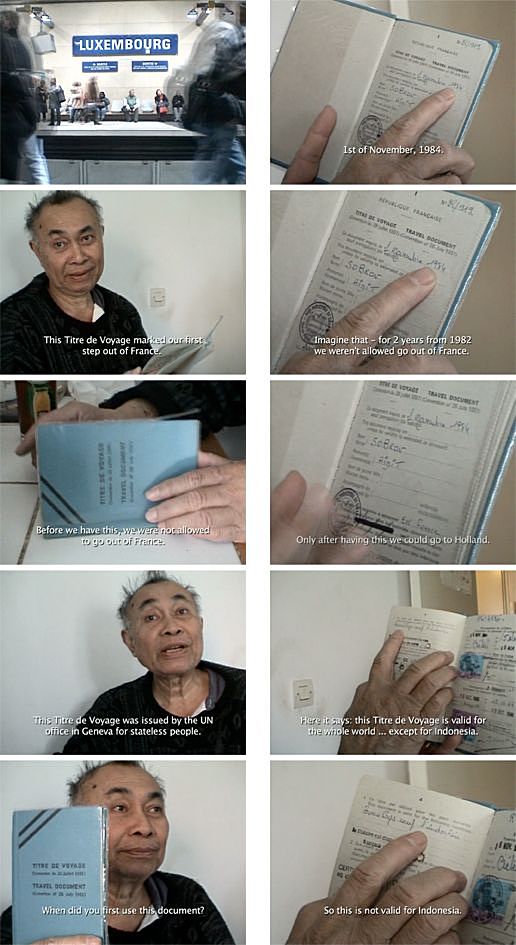 |
Video stills from Pulang — draft 3 (Tintin Wulia, 2008), documentary, single-channel video, |
Although I never relate too much to Chinese culture (I have no Chinese name, and no one in my family speaks Chinese), I detected a reverse parallel of my family’s story in Anita’s. My preceding generation had to change their names to ‘Indonesian’ names. We had to keep a secret that, like hers, stemmed from 1965. From 1967, the use of Chinese language in Indonesia was banned for 33 years. Was my family, together with many Chinese-Indonesian survivors of 1965, also exiled within the confines of our own country, Indonesia?
Fear, taboo and Chineseness in Indonesia
In 2007 I first mentioned my father’s long-unused Chinese family name in a public talk. For several seconds immediately after mentioning it, I felt a fear similar to when I first told a circle of friends in 2005 that my grandfather was taken away in 1965. When a Chinese-Indonesian artist/curator (born pre-1965) commented that my works were ‘brave’, I felt a similar, irrational fear.
Our generation demands explanation
Upon seeing my Great Wallpaper series, a Chinese-Indonesian filmmaker (born post-1965) admitted he had never seen such documents. Apparently his parents keep theirs hidden and, whenever required, would take the papers themselves to the authorities, so their son need not see them. In his new film, this filmmaker included a long static shot of a grandfather explaining the origin of his name to his granddaughter (The film is Babi Buta Yang Ingin Terbang, The Blind Pig Who Wants to Fly, by Edwin, due to be released at the end of 2008: find out more at http://www.babibuta.com/).
Our generation demands explanation. However, as far as parents are concerned, there is often a preference to remain silent. In a text written by Nano Riantiarno and published in Matra magazine in July 1998, Sundoro Wijaya is the father of a Chinese-Indonesian girl, Melati. He ‘did not have the heart to tell his six year-old daughter about the Chinese problem.’ It was ‘an old story he wanted to forget.’ Riantiarno’s text opened with Melati coming home crying because her teacher insisted that she must have had an ‘original name’, although she knew herself only as Melati Wijaya.
As part of (Re)Collection of Togetherness (started in 2007), I collect people’s names and write them down randomly next to fake blood specks in books with fake passport covers. Amongst many discoveries I have made through this project is that in the Philippines a name like Alexis Tioseco is a Chinese name. For the Filipina who pointed this fact out to me, it was an obvious Chinese name, perhaps as obvious as Sugiharti Halim is to Indonesians. (Sugiharti Halim is a short film made by Ariani Darmawan in 2008 in which the main Chinese-Indonesian character, Sugiharti Halim, recounts the different reactions she gets from people upon hearing her name, see Ariani Darmawan’s blog at http://arianidarmawan.net/). In Anak Naga Beranak Naga (Dragon begets Dragon, a documentary about assimilated traditional Chinese-Indonesian culture in Jakarta made by Ariani Darmawan in 2006), an interviewer asks a non-stereotypical Chinese-Indonesian character for her ‘original name’, as though to confirm that the character we see on screen is indeed Chinese-Indonesian.
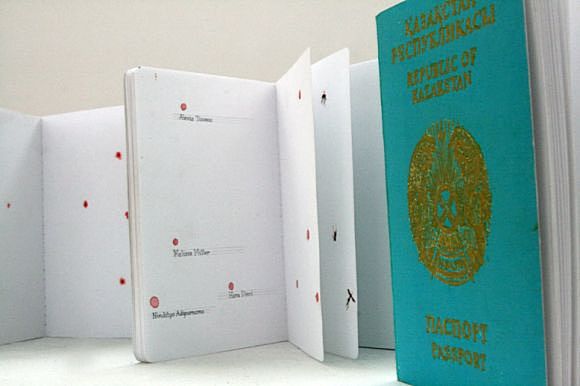 |
Detail from (Re)Collection of Togetherness — stage 2 (Tintin Wulia, 2008), object-based installation, |
Are names like Kok Hien, Kok Tjiang, Kok Kuang, less ‘Indonesian’ than Sugiharti Halim? Kok Hien was born in the year that Indonesia gained independence, 1945 and his name means ‘the nation is born’. Kok Tjiang was born in 1949: his name means ‘the nation develops’. Kok Kuang was born in 1951: his name means ‘the nation prospers’. My grandfather, Liauw Liong Kee, sincerely and wistfully named them, my uncles, moved by a deep Indonesian-nationalist spirit. In 1965 my grandfather was taken away and his body was never found.
This is the Chineseness I grew up with: a taboo that always managed to get spotted, an identity constructed by fear, the origins of which the generation which preceded mine wishes to forget
The remainder of my family changed their names to ‘Indonesian’-sounding names. My uncles’ Indonesian names bear no resemblance to the Indonesian nationalist meanings of their Hokkien names.
This is the Chineseness I grew up with: a taboo that always managed to get spotted, an identity constructed by fear, the origins of which the generation which preceded mine wishes to forget.
Yanto’s story: 1965 as a common ground
In desperation, Yanto quit high school and began surveying 1965 on his own. His questioning led to an old military pensioner who admitted living in trauma because he had to shoot his own brother who had been randomly picked up by his colleagues as a communist. Nadiah Bamadhaj, during her exhibit Enamlima Sekarang (Sixty-five Now, 2004), was approached by a man who, trembling with a mix of horror and wrath, declared that she as a Malaysian artist knew nothing: had he not killed in 1965, he would have been killed. Both the murdered and the murderers live side by side in trauma, each leading their own secret exile after 1965.
In only a few hours, Yanto and I formed a kind of camaraderie out of a shared secret originating in 1965. I thought that the act of reproducing giant fading murals of my family’s legal documents would only spark discussions about Chinese-Indonesianness; I learned from Yanto about the deeper, more urgent context.
The riots of May 1998 helped me to gain knowledge about the feelings I inherited from 1965. In turn this new knowledge leads me to understand how closely related my Chineseness is to Indonesia’s history. It is not a Chineseness inherited from mainland China, nor from the Korean television series adopted by celebrities like Mulan Kwok that are so popular now on Indonesian television. It is not from anywhere outside of Indonesia, but from deep beneath its scars. ii
Tintin Wulia (tintin@wulia.com) is currently based in Melbourne, Australia. Through her art she researches the tension between the personal and the political, particularly in the context of boundary renegotiations. Visit her blog at http://tintinwulia.com
